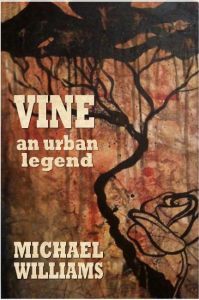Not For The Casual Reader
You know me, kids: I love a good goofball comedy or popcorn mystery. But that’s a gift that a few excellent teachers have given me: the choice. I can enjoy fluff because I enjoy it, not because I’m afraid I won’t understand something unless it’s simple. Sometimes you aren’t supposed to understand something, you’re supposed to worry it like a dog with a bone: not to understand it, but to enjoy the substance.
Anyway, my pal Michael Williams is here today to talk about “not for the casual reader”, which I think is a label as pride-worthy as “seven million copies sold” or “a zany laff riot”. If you don’t know why I think it’s funny that I’m sharing Michael’s post on April 15, see this definition.
Take it away, Michael!
~ * ~
 Elsewhere I have written about my ambivalent thoughts following the blog tour for my most recent novel, Vine. However, Marian Allen is a long-time friend of mine, and in a recent conversation, I brought up a phrase from one of the reviews I received, and how the phrase struck me. Marian asked me to expand upon those thoughts and to post them here in her blog. So, let’s talk about “not for the casual reader”.
Elsewhere I have written about my ambivalent thoughts following the blog tour for my most recent novel, Vine. However, Marian Allen is a long-time friend of mine, and in a recent conversation, I brought up a phrase from one of the reviews I received, and how the phrase struck me. Marian asked me to expand upon those thoughts and to post them here in her blog. So, let’s talk about “not for the casual reader”.
That was the phrase, and it came from a mixed review. I like mixed reviews, because they usually indicate (as this one did) close reading and close thought. The reviewer commented on the fragmentary style of the book (absolutely intentional) and its difficulty (perhaps a side effect of the fragmentary style). In both cases, I embrace the observation. My books aren’t for casual readers: there is a whole big market out there for precisely those readers, a market I decided to forgo early on as I discovered the kinds of books I like to write, and how they veer away from the casual.
I like a book that makes you work. I’m not reading for entertainment or escape alone, or at least not all of the time. I like writing that juggles words, that narrates in fragments or at a slant, that mashes story against story and asks me to draw the connections. Because when I make the connections myself, they are more powerful than when the writer spells them out for me: they show me that a story respects me, asks more of me than to sit there and watch.
Because we complete the stories we read. At the most basic levels—the levels at which we began to enjoy reading—we make pictures of characters, situations, and events, and get lost in the world of a book. It’s still the way I read a lot of fiction, because that’s the way the writer is asking me to read by the style and structure he or she has chosen. I try to accept it on the terms it presents.
Which means that when writers play over the surface and form of a text, perhaps they want to do something else—something in addition, or something altogether different. Perhaps they want to challenge you to try to read their work in a way that you are unaccustomed to reading.
Of course, there is plenty of bad writing that you reject outright, but it’s only fair (isn’t it?) to accept the story for the kind of story it is, to not listen to Jimi Hendrix the same way you listen to Brahms, because damn! is that fair to either one of them? So if it doesn’t work for you, set it down. Don’t get mad at the writer because you can’t drive his car to visit your relatives.
And for those who say that the primary duty of a writer is to the reader…well, you’re right. The reviewer I mentioned above nailed it when he said “not for the casual reader”. My duty is to the reader as well, but I find my readers generally want something that plays with the way a story is told, that keeps them on their toes in ways that they find amusing or fun. I don’t know whether you’d like my books—Marian tells me that she does, and I’m glad of that. But the only way to tell is to pick one up, give it a shot. I hope you like it, but if you don’t, there’s a world of good writing elsewhere.
Magic Realism – Michael Williams’ blog
~ * ~
Thanks, Michael!
If you aren’t familiar with Michael Williams’ work, I highly recommend it.
A WRITING PROMPT FOR YOU: Write a character who likes to read difficult fiction. Make him or her NOT a pompous ass, a disconnected fuzz-brain, or any of the other stereotypes of people who enjoy difficult fiction.
MA






